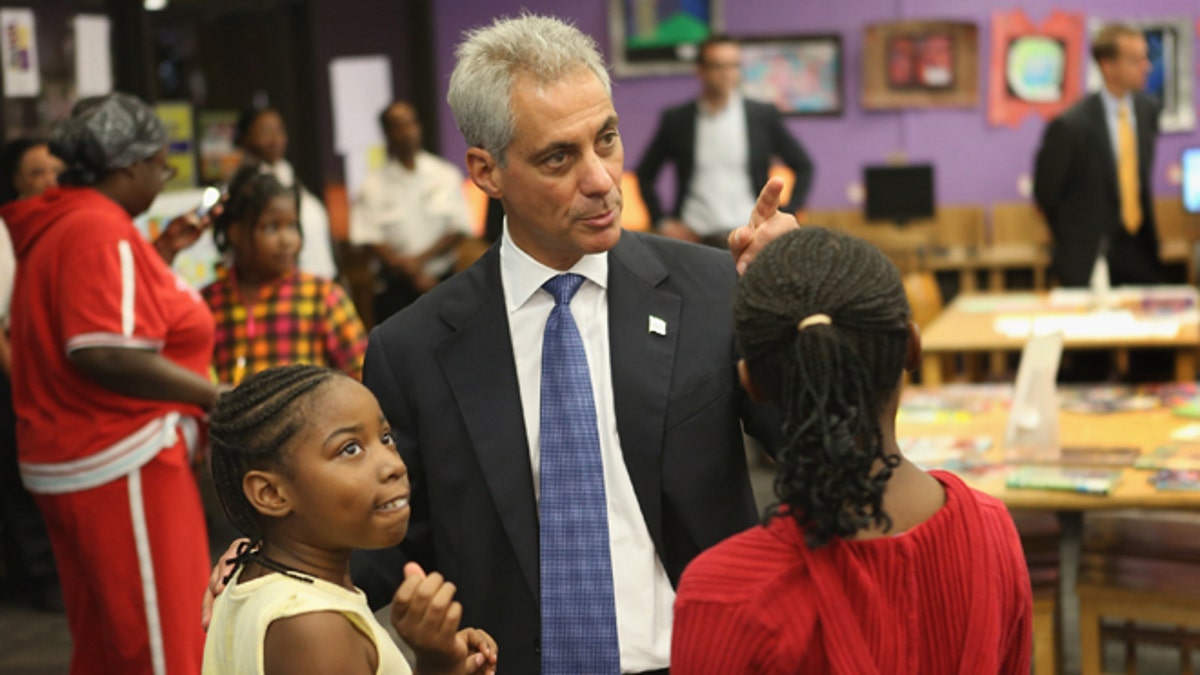
CHICAGO, IL - SEPTEMBER 10: Mayor Rahm Emanuel (2nd R) visits Chicago Public School children at Woodson Regional Library in Chicago, Illinois. (Photo by Scott Olson/Getty Images) (2012 Getty Images)
The Chicago teachers strike has entered its second week and has left parents -- many Latino and many in poverty -- scrambling to make alternative child care arrangements as Mayor Rahm Emanuel turns to the courts to end the strike.
Nearly 180,000 Latinos attend Chicago public schools, accounting for 44 percent of the entire student population. Now, parents will have to look for arrangements for at least the next two days.
In their mostly Latino neighborhood of Pilsen on Chicago’s Southwest side, many families - 27 percent, according to the 2010 U.S. Census – live below the poverty line and had to decide Monday whether a parent could afford to stay home from work to be with their children, or arrange for alternative child care.
This was a strike of choice and is now a delay of choice that is wrong for our children.
The union and school leaders seemed headed toward a resolution at the end of last week, saying they were optimistic students in the nation's third-largest school district would be back in class by Monday. But teachers uncomfortable with a tentative contract offer decided Sunday to remain on strike, saying they needed more time to review a complicated proposal.
Emanuel fired back, saying he told city attorneys to seek a court order forcing Chicago Teachers Union members back into the classroom.
The strike is the first for the city's teachers in 25 years and has kept 350,000 students out of class, leaving parents to make other plans.
Working mom Dequita Wade said that when the strike started, she sent her son 15 miles away to a cousin's house so he wouldn't be left unsupervised in a neighborhood known for violent crime and gangs. She was hoping the union and district would work things out quickly.
"You had a whole week. This is beginning to be ridiculous," Wade said. "Are they going to keep prolonging things?"
Facts
According to the most recent Census data from 2010, about 25,000 Latinos call the Lower West Side neighborhood, the area around Pilsen, home. Latinos make up over 82% of the neighborhood's population.
About 27% of the families in the area live below the poverty line, compared to about 15% nationwide.
About 22% of the population has less than a high-school education, compared to about 15% nationwide.
Latinos make up 20% of all Chicago public school staff, and about 16% of teachers--1 in 6--are Latino.
Months of contract negotiations have come down to two main issues central to the debate over the future of education across the United States: teacher evaluations and job security.
Union delegates said they felt uncomfortable approving the contract because they had seen it only in bits. The union will meet again Tuesday, after the end of the Rosh Hashanah, the Jewish new year.
"There's no trust for our members of the board," Chicago Teachers Union president Karen Lewis told reporters Sunday night. "They're not happy with the agreement. They'd like it to actually be a lot better."
Emanuel said the strike was illegal because it endangers the health and safety of students and concerns issues — evaluations, layoffs and recall rights — that state law says cannot be grounds for a work stoppage.
"This was a strike of choice and is now a delay of choice that is wrong for our children," Emanuel said in a written statement.
The strike has shined a spotlight on Emanuel's leadership more than ever, and some experts have suggested the new contract — which features annual pay raises and other benefits — is a win for the union.
"I'm hard-pressed to imagine how they could have done much better," said Robert Bruno, a professor of labor and employment relations at the University of Illinois at Chicago. "This is a very impressive outcome for the teachers."
With an average salary of $76,000, Chicago teachers are among the highest-paid in the nation, and the contract outline calls for annual raises. But some teachers are upset it did not restore a 4 percent raise Emanuel rescinded last year.
Emanuel pushed for a contract that includes ratcheting up the percentage of evaluations based on student performance, to 35 percent within four years. The union contends that does not take into account outside factors that affect student performance such as poverty and violence.
The union pushed for a policy to give laid-off teachers first dibs on open jobs anywhere in the district, but the city said that would keep principals from hiring the teachers they think are most qualified.
The union has engaged in something of a publicity campaign, telling parents about problems that include a lack of important books and basic supplies.
Some parents said they remain sympathetic to teachers.
"I don't think they're wrong. The things they're asking for are within reason," said Pamela Edwards, who has sent her 16-year-old daughter to one of about 140 schools the district has kept open during the strike to provide meals and supervision.
Others said they understand why teachers are taking their time.
"As much as we want our kids back in school, teachers need to make sure they have dotted all their i's and crossed their t's," said Becky Malone, mother of a second grader and fourth grader, who've been studying at home and going to museums over the last week. "What's the point of going on strike if you don't get everything you need out of it? For parents, it'll be no more of a challenge than it's been in the past week."
Reporting by the Associated Press.
Follow us on twitter.com/foxnewslatino
Like us at facebook.com/foxnewslatino







































